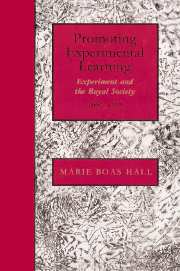Book contents
- Frontmatter
- Contents
- List of figures
- Preface
- A note on dates
- 1 Introductory
- 2 Aims and ideals
- 3 The record of the minutes 1660–1674
- 4 The communication of experiment 1660–1677
- 5 The record of the minutes 1674–1703
- 6 The communication of experiment 1677–1803
- 7 The record of the minutes 1703–1727
- 8 The communication of experiment 1703–1727
- 9 The view of the world; friend and foe
- Abbreviated titles
- Notes
- Bibliography
- Index
6 - The communication of experiment 1677–1803
Published online by Cambridge University Press: 03 December 2009
- Frontmatter
- Contents
- List of figures
- Preface
- A note on dates
- 1 Introductory
- 2 Aims and ideals
- 3 The record of the minutes 1660–1674
- 4 The communication of experiment 1660–1677
- 5 The record of the minutes 1674–1703
- 6 The communication of experiment 1677–1803
- 7 The record of the minutes 1703–1727
- 8 The communication of experiment 1703–1727
- 9 The view of the world; friend and foe
- Abbreviated titles
- Notes
- Bibliography
- Index
Summary
With Oldenburg's death, the Society was faced with a crisis in communication with which it was ill equipped to deal. In the autumn of 1677, although some letters continued to come in from abroad (naturally still addressed to Oldenburg), no one, not even Henshaw who was officially Secretary, seemed prepared to answer them, while the Philosophical Transactions (after all, Oldenburg's private business) came to an abrupt end. Nor was there immediately anyone prepared to take up such tasks as those of preparing Malpighi's works for publication. No future Secretary was ever to be quite so zealous as Oldenburg until Sloane became Secretary in 1693; he was very energetic, but busy though he was he did not have quite so many tasks in hand as Oldenburg, nor was he so skilled as Oldenburg in establishing a network of correspondence. Although the Society was to take such steps as it could to re-establish the tried methods of communication, it took time. Not everyone was at first convinced that foreigners and strangers ought to learn of the Society's affairs, and future Secretaries had to be both guided and goaded in their tasks.
The first concern of the Council was to recover the Society's books and papers which had been in Oldenburg's hands, a task complicated by the fact that Oldenburg had died intestate, as well as by Hooke's eager desire to peruse all papers relating to the controversy between Huygens and himself, which, he was certain, Oldenburg had managed to his, Hooke's, disadvantage. The second task was to regulate the Society's affairs in a period when the President, Brouncker, was ill, and the surviving Secretary, Henshaw, was acting as Vice-President in his place.
- Type
- Chapter
- Information
- Promoting Experimental LearningExperiment and the Royal Society, 1660–1727, pp. 98 - 115Publisher: Cambridge University PressPrint publication year: 1991



